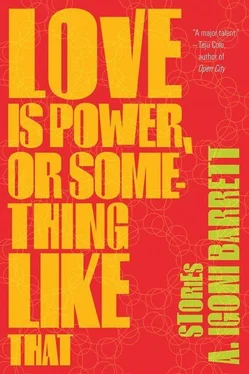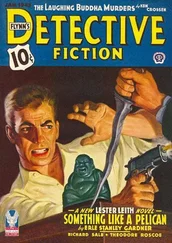Dimié Abrakasa shrugged. “Me too,” he said.
As Chibuzo gathered the balls and bats, the two boys left together. They strode across the sandscape, their footsteps flopping, their progress marked by the leap-and-dance of their shadows.

At the end of Yakubu Gowon Street loomed a pink, three-story building, a hotel. The wall around it was crowned with colored glass shards, and the yard was planted with a profusion of fruit-bearing trees. Near the gate a large false almond tree grew at an abnormal angle and leaned over the wall. Its foliage formed a thick shade on the outside of the fence.
The boys reached the fence, and Ériga walked under the tree shade, turned to face the road, sank into a crouch in the bed of dead leaves, and rested his shoulders against the wall. Dimié Abrakasa followed. A gentle breeze wafted the smell of decayed fruit into their faces. A moment of silence, during which the leaf dust stirred by their arrival sailed through the air, and then Ériga touched Dimié Abrakasa’s shoulder, said, “Wetin be your name?”
“Dimié.”
“Dimi. Dimi Craze. . De Craze.” Ériga nodded, pleased with himself. “I go call you De Craze. My name nah—”
“Ériga. I know.”
Dimié Abrakasa trapped a wood ant crawling up his arm. He picked it off his skin and looked at the waving legs, the snapping pincers. He crushed it between his fingertips and wiped his hand on his jeans.
“Why you stone that crazewoman?” Ériga asked. His eyes were fixed on his companion’s hand — the long, tapered fingers, the bitten-down nails, the network of fine veins.
Dimié Abrakasa noticed the direction of his gaze, and balled a fist. “Nothing,” he replied. But the image rose in his mind of his mother sitting in bed with her knees drawn up and her hands pressed against her ears. His fist rose in the air and struck his knee twice, then he let his hand fall onto the carpet of leaves.
“You be strange person sha. De Craze,” Ériga said.
The street grew busy with schoolchildren returning from extramural classes. A group of uniformed girls was headed toward the hotel. The girls whispered to each other and darted glances at the boys; as the group filed past, the girl who walked in front turned her head to stare at Ériga, and snorted with laughter.
Ériga sprang to his feet and bounced on the balls of his feet toward the girl. The girl was tall and stocky, she had the calves of a shot-putter, her hair was shaved to bristles, and she wore the one-piece dress of a high school junior. Her sole ornament was a rubber wristband that announced her loyalty to Chelsea FC. Ériga drew up alongside her, and asked in a rude, deepened voice, “Nah who you dey laugh, woman-man?” The whole group halted and faced him. He repeated his question, and the girls, as if on signal, broke into peals of laughter. They stamped their feet and clutched their bellies and bumped against each other. Ériga’s face puckered with anger. He grabbed the wrist of the girl whom he’d addressed and twisted her arm, not too much, but enough to make her aware of his strength. “Laugh now,” he said, and pulled her forward, trod on her foot.
The girls fanned out, encircling him, buzzing like disturbed bees. He felt the movement of his hostage, but thought nothing of it, until her fist sank into his belly. He released her arm and doubled over, mewling with agony.
“Are you crying?” the girl said, as she bent over him and clasped his shoulder in playacted sympathy. “Stand up—” her words were interrupted by a snigger, “if you can.”
Gritting his teeth, Ériga straightened. The girls watched him and waited. He stood, undecided. Dimié Abrakasa stood up. “I know you,” he said, addressing the girl who’d struck Ériga. “We used to go to the same school — you remember? — Saint Ignatius.”
The girl stared at him. “You are Méneia’s elder brother?”
“Yes.”
“Ehen — so it is you! I was telling myself that I know your face.” She stepped forward, bumping Ériga with her shoulder, and thrust out her hand for a handshake. Dimié Abrakasa took it. Her grip was firm. She kept hold of his hand. “Adafor is my name. Your own is. . ah, I’ve forgotten.”
“Dimié.”
“Dimi! Yes, Dimi.” She beamed at him. “I’ve come to your house before,” her tone dropped, took on some hue, a bit of blue, “when your father died.” Then her face brightened. “What school are you attending now?”
“GCSS Boys,” Dimié Abrakasa said.
“I’m in Holy Rosary.”
“I know.”
“How?”
“You’re wearing the uniform.”
Adafor laughed, tugging at his hand as she swayed. Then she caught the smirk on Ériga’s face, and her laughter stopped. She released Dimié Abrakasa’s hand.
“This dude is your friend?” she asked.
“Yes,” Dimié Abrakasa said.
Her nostrils flared with disapproval. She opened her mouth, but shut it without a sound, then looked at Ériga. “You will fall inside my trap another day.” She turned back to Dimié Abrakasa. “Greet your sis for me.”
As the girls’ voices receded round the corner, Dimié Abrakasa asked, “How your stomach?”
“Okay,” Ériga said. He took a step forward, then pulled up sharply and burst out: “Girls!”
Dimié Abrakasa laughed. “I agree with you, troublemakers. I get one for house.”
“Forget them abeg. Hunger dey waya me — I wan’ go find food.”
At the mention of food, Dimié Abrakasa glanced over his shoulder in the direction of his street. “I have to go,” he said.
“Oh, all right,” Ériga said, and reached his hand into the waistline of his trousers. His hand emerged with a flash of blue, a Chelsea FC wristband. He slipped it around his wrist and admired the fit, then looked up and caught Dimié Abrakasa staring. He dropped his arm to his side and edged away.
“Hey!” Dimié Abrakasa called. Ériga halted.
Dimié Abrakasa recalled the moments of his meetings with Ériga: the request in the alley, the amount of the bet with Krotembo, the scuffle with Adafor. The disappearance of his money. Now it made sense. Random pieces fell together and a picture rose in his mind. Just like table tennis had served as bait for Krotembo, the baiting of the madwoman was the game that lured him into Ériga’s trap. But of course. And the dare to stone her was the bet, the gambler’s opening, the pickpocket’s ploy. For Ériga, he was sure, was a pickpocket, a master thief.
His heart pounded in his head as he stared at Ériga. He was furious, as much with himself as at Ériga, and now that he felt a kinship with Krotembo his sympathy for the outsmarted boy grew to levels almost unbearable. Ériga was shameless and hardened in his ways — he had seen ample evidence in the episode with Krotembo. Yet he hoped. Maybe Ériga would do the right thing, given a chance.
“Erm,” Dimié Abrakasa said, his voice a croak, saliva clinging to his teeth, “I fit borrow money from you?” The boys searched each other’s faces. Dimié Abrakasa dropped his eyes. “Please,” he said. “I lost my mother’s money today.”
Ériga’s tone was curt. “I no get anything to give you.”
Dimié Abrakasa nodded, and averted his face to hide the angry tears that wet his eyelashes. He turned, walked away, but after a few paces he glanced around. Ériga stood at the same spot, watching him.
“Bye-bye, De Craze,” Ériga said softly, then whirled around and quick-stepped away, his arms swinging.
.8 .
Night was seeping in from the sky’s edges when Dimié Abrakasa arrived at number 197. He met the landlord driving in. Alhaji Tajudeen stuck his head out the window and yelled, above the noise of the engine, “Wait there for me!”
Читать дальше


![Сьюзан Кейн - Quiet [The Power of Introverts in a World That Can't Stop Talking]](/books/33084/syuzan-kejn-quiet-the-power-of-introverts-in-a-wo-thumb.webp)










